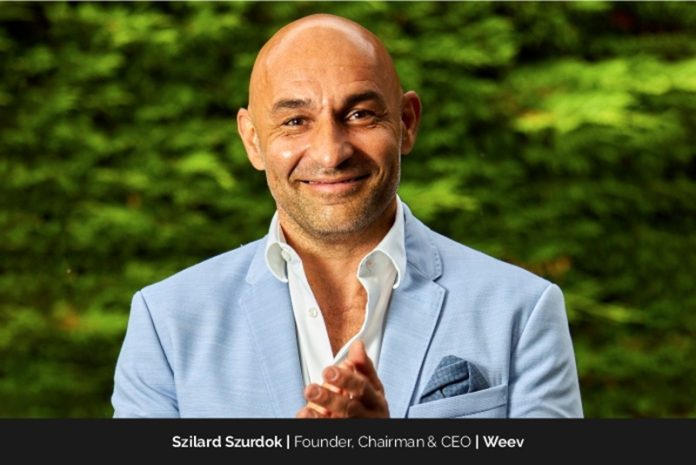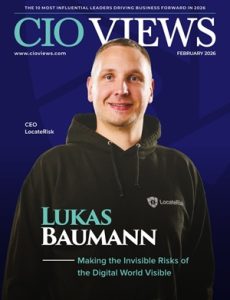The footwear and apparel industry is undergoing disruption due to digitalization, the rise of AI, and shifting customer preferences. Szilard Szurdok, Founder, Chairman, and CEO of Weev, is playing a leading role in transforming the industry by simplifying and accelerating the way products are developed and manufactured.
As of the Age of 11, Szilard was competitively riding BMX bikes and this frequently took him to the USA to ride. There he learnt to live the “American Dream” that everything is possible, to never give up and work hard until you reach goals. His purpose is not to gain status or wealth but to do something innovative that benefits every stakeholder and and particularly the final customers. He wants to experience the happiness that comes from the satisfaction of being able to create positive change on a broader scale, beyond the world he inhabits. Success, for him, means happiness.
A Recap of Professional Journey
Szilard’s parents came to Switzerland as refugees. He recalls growing up poor, with no status, but even though they were immigrants, the country supported him throughout his journey and offered him everything he needed.
Education is free in Switzerland. This allowed Szilard to attend the prestigious University of St. Gallen, which is called the Harvard of Switzerland. He says with a smile that he chose the university because of its sports program and coffee. “I didn’t realize how tough it was going to be,” he adds.
Management consulting is the popular career path for a majority of St. Gallen’s students. Szilard was aware of his limitations and knew he would not be successful in management consulting. So, when he received job offers from McKinsey, IBM, and HP, he felt he would not survive at McKinsey. He found the atmosphere at IBM “really cool,” but, according to him, every man there was dressed in a similar fashion. They all looked the same to him. HP’s environment was a complete contrast. Szilard saw people dressed in colors, wearing everything from shorts to suits, and at lunch, there was no one at the desk – they were talking to each other. The HP of the 1990s was very much like today’s Google, Szilard says.
Szilard joined HP and started in the supply chain. Later, he transitioned to the e-banking division, and then he moved to software in the fintech space. “What I liked about software was that you could always change what you do,” Szilard points out. He explains that developers usually have an idea of the end product from the beginning, but the journey to achieve that is unknown. They have to figure things out along the way, and compromises are often necessary, he points out, adding that if software is not well received, it can always be changed.
“I liked this flexible concept of software,” Szilard says. “Whatever developers sell to their customers, they can come back and say, ‘I don’t like it. I want a different version.”
Szilard worked at HP for about 11 years. He exited the company as Vice President of Financial Services. After that, he worked at Moby Dick Productions as Partner. Then he founded PXL AG and later served as Executive Chairman at Core Transformation.
The Beginning with Weev
Szilard’s core capabilities are in fintech, and he has spent the majority of his career in banking. When the COVID-19 pandemic shut down much of the world, Szilard returned to Switzerland from the U.S., where he had completed a core banking IPO. “I was so exhausted that I slept for like six months,” he says. During this period, a friend asked him to meet Wilhelm Mohlmann, a 75-year-old shoe producer, who had built an interesting software. He wanted Szilard to check the software.
Szilard points out that Wilhelm is one of Switzerland’s most successful — and innovative — shoe producers after the Second World War. When he turned 70, he began to face problems creating products, which prompted him to develop software. Szilard liked the software, but he also noted the potential for improvement. He told Wilhelm that he would like to invest 10% in his company. His initial plan was to enhance Wilhelm’s solution by integrating his company’s software. However, he eventually decided to take full ownership of it, instead of investing in it.
When Szilard became eager to buy Weev, he also realized that the discussion around supply chains was not just about creating products. It was also about environmental issues. In the fashion industry, a major shift is underway because of the growing awareness of waste and sustainability. In the U.S. alone, an estimated 80 to 100 pounds of clothing per person are thrown away every year, Szilard notes. Many of these clothes have never been worn. This observation led him to identify an opportunity.
When Szilard first entered the footwear industry, he noted that it was where he had been when he started in IT, almost three decades ago. He thought he could use his experience to make a contribution. He also points out that during the COVID-19 pandemic, there were major issues with the supply chain. People were not getting the things they needed. This triggered his renewed interest in the supply chain space. “And once I stepped into this industry, I realized working with people in fashion was fun,” he says. “They are creative and have a sense of humor, unlike the people in banking, who are more analytical.” He found the whole environment refreshing, and now, he enjoys being part of the community.
Challenges and Achievements
Weev connects brands, designers and suppliers in the footwear and apparel industry on a shared platform to make the creation process faster, more transparent, and more sustainable. Szilard acquired it in 2021. “I bought a solution that already had clients, and it was working,” he points out. He decided to make minor changes and integrate his own company’s solution to do all the 3D elements for materials visualization. Szilard points out that there was no digital solution to solve the problem of sending swatches, small pieces of fabric, across the market for people to touch and evaluate. Weev has digitalized this process, making the conventional sample and material books a thing of the past.
“I initially thought that I would spend one or two million and one or two years on it, after which we would start to grow,” Szilard says. At the time, their focus was primarily on brown shoes. It took Szilard four and a half years and an investment of seven million to see the growth of Weev. But these years were eventful. During this period, Szilard received calls from major shoe brands expressing their admiration for what he and his team were doing. They were also interested in adopting their solution. Brands such as Nike and Adidas had failed to come up with a similar solution for one reason or another, despite spending millions of dollars.
“I built a solution, and I had around 60 clients following me,” Szilard says. He also received calls from the industry’s heads of innovation, expressing their interest in watching him and his team over the next couple of years. Szilard agreed on the condition that they would support them in their endeavor – and they did that. “It was a lot of fun, but at the same time, there was pressure too,” Szilard points out.
He explains that the companies supporting them had a different workflow and unique work processes, and not all their processes were digital. There was a language problem as well; for example, the U.S. and Europe use different terminology for the same material. So, according to Szilard, they had to build a system that featured a workflow that could be followed by all. It required a lot of brain work to design it. Then, for the international language issue – as there is a collaboration between people from different countries, they had to think of a generic language for all the attributes. They also had to develop a collaboration platform – which is not an app — that people would be willing to use to gain all the information.
Szilard says that they built a new solution from scratch, featuring a workflow that suited every company and a common international language. The biggest challenge, however, was bringing all the parties together, including suppliers and designers, so that they could talk with each other. For Szilard, this was his biggest intellectual challenge because ultimately, it is about people involved in the footwear and apparel industry and not technology.
In 2024, Salesforce Founder Marc Benioff made a substantial investment in Weev, describing it as a potential unicorn. Following this investment, Weev began working closely with Salesforce, integrating Salesforce AI into the Weev application—a strategic move that opens up endless business opportunities for the company.
Stepping Into the Role of CEO
When Szilard took over Weev, he appointed a woman as CEO. “I never wanted to be the CEO because I believed I didn’t understand the business,” he says. As CEO, Joanne Stetson led the company for about three years, and under her leadership, they captured all the knowledge from the industry that is now integrated into the system. However, she couldn’t manage the future demands, as she came from an industry that was slow to embrace technology. Because of that, Szilard was forced to step into the role of CEO, almost a year ago. He initially intended to serve in this role temporarily. “But now, being the CEO of this company, I’ve realized I’m actually not even that bad,” he says with a smile.
Szilard has a different leadership approach. He follows Warren Buffett’s example of keeping his weekly calendar almost empty. “I try not to hold meetings,” he says. He has empowered everybody to do everything without his help. He often tells them that even if something goes wrong, just go ahead. Whether it is a marketing activity or a specific development for the system, Szilard lets everybody do what they want to do.
“I follow, I understand, and I point out if they are wrong,” Szilard says. “My personal interest as a CEO is to make sure that everybody in the company is going through the same journey and evolution because that is how the company can achieve success.” And anything that cannot be solved by anyone ends up with Szilard. “I only do them and take a few major decisions,” he says. “Otherwise, I mostly let people decide.”
“Jeff Bezos said that when you are in the top management, you have to make very few decisions, and you need to do them right,” he adds. “And that’s what I’m doing.”
Szilard sees himself as a leader who serves. He points out that even when he was running the company as a chairman, he was involved in selling, did bookkeeping when they had an event, and got food for the team. He is always ready to get his hands dirty. “I’m here to serve others and support others,” he says.
Supporting the Team and Interest
Szilard derives his motivation from his team’s evolution. For him, it is always about them and not about him. “Most of these people have never experienced that,” he points out. “They always worked in environments where they got support, but just on one or two levels.” He believes in supporting his team on all levels, as, according to him, everyone is here for a moment, and he likes to use this moment to support others. Also, he is a leader who never tells his team what to do. He believes in asking questions that enable them to figure out how to do something.
Szilard believes that they are on a journey in the fashion industry to make everything more sustainable and traceable. “We are in a lucky position as we are neutral and independent,” he says. “We don’t belong to any lobby. So, I have the power to not have an opinion in the interest of any other party.” His interest is in forming the right opinion that people or society expect from the industry. “That is what I’m trying to do,” Szilard says.
Plans for The Future
Szilard believes they will become the market standard among the different stakeholders. This is not because of the digitalization of the market or creativity, sustainability, or traceability. According to Szilard, it is because of blockchain, NFTs, and digital content that needs to be protected. He expects Weev to become the digital age’s yellow pages that allow everybody to see everything while also keeping the data protected.
“I strongly believe we will become a standard of the creation process, and also facilitate the ease of doing it in all businesses,” Szilard points out. “It will be a commodity, available at the same time for everybody who is interested in this information, but at the same time, also protect everybody.”
Message to Aspiring Leaders
“Be resilient, persevere, and never give up” is Szilard’s advice to aspiring leaders. “You can bring any idea to success if you don’t give up.”
Achieved More than I Believed!
The son of a refugee has come a long way from his humble beginnings. Today, he is in a position to give back. When he looks back, does he believe he has achieved everything he dreamed of? “Yes,” he says.
When he was 37, he felt that he had achieved everything that he had dreamed of. He also retired for the first time at that age. “I’m currently in a bonus program,” Szilard says. “Now, I have no expectations. I have achieved much more than I ever believed I would be able to do.”
Read More Exclusive Interviews





